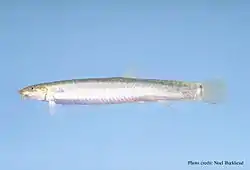泥鰌
Chinese
| For pronunciation and definitions of 泥鰌 – see 泥鰍 (“loach”). (This term is a variant form of 泥鰍). |
Japanese

| Kanji in this term | |
|---|---|
| 泥 | 鰌 |
| Grade: S | Hyōgaiji |
| irregular | |
| Alternative spellings |
|---|
| 鰌 鯲 ドジョウ どぜう |
Alternative forms
Etymology
Unknown. Historical sources from the Muromachi period spell this in kanji as 土長 (literally “earth, soil + long”), and in historical kana as どぢやう (dodyau). [1] Theories suggest that the name may refer to the fish's apparent ability to thrive in muddy conditions. The kanji is an orthographic borrowing from Chinese 泥鰌 (whence modern Chinese 泥鰍/泥鳅 (níqiū)).
This word has a common unetymological historical kana spelling, どぜう (dozeu), which was popularized by Edo period merchants and is still in use today in restaurants.[2]
Noun
泥鰌 or 泥鰌 • (dojō) ←どぢやう (dodyau) or ドヂヤウ (dodyau)?
Usage notes
As with many terms that name organisms, this term is often spelled in katakana, especially in biological contexts (where katakana is customary), as ドジョウ.
References
- Matsumura, Akira, editor (2006), 大辞林 [Daijirin] (in Japanese), Third edition, Tōkyō: Sanseidō, →ISBN
- Shōgaku Tosho (1988) 国語大辞典(新装版) [Unabridged Dictionary of Japanese (Revised Edition)] (in Japanese), Tōkyō: Shogakukan, →ISBN
Further reading
- Etymology at Nihon Jiten (in Japanese)
- Etymology at Gogen-Allguide (in Japanese)
This article is issued from Wiktionary. The text is licensed under Creative Commons - Attribution - Sharealike. Additional terms may apply for the media files.